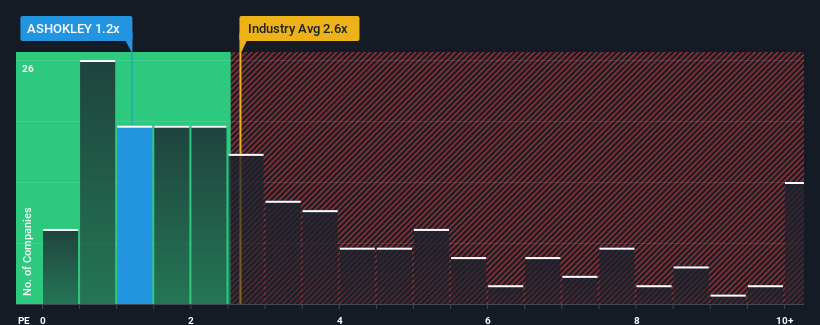Little Excitement Around Ashok Leyland Limited's (NSE:ASHOKLEY) Revenues

You may think that with a price-to-sales (or "P/S") ratio of 1.2x Ashok Leyland Limited (NSE:ASHOKLEY) is a stock worth checking out, seeing as almost half of all the Machinery companies in India have P/S ratios greater than 2.6x and even P/S higher than 6x aren't out of the ordinary. However, the P/S might be low for a reason and it requires further investigation to determine if it's justified.
View our latest analysis for Ashok Leyland

How Has Ashok Leyland Performed Recently?
With revenue growth that's superior to most other companies of late, Ashok Leyland has been doing relatively well. It might be that many expect the strong revenue performance to degrade substantially, which has repressed the share price, and thus the P/S ratio. If the company manages to stay the course, then investors should be rewarded with a share price that matches its revenue figures.
Want the full picture on analyst estimates for the company? Then our free report on Ashok Leyland will help you uncover what's on the horizon.What Are Revenue Growth Metrics Telling Us About The Low P/S?
There's an inherent assumption that a company should underperform the industry for P/S ratios like Ashok Leyland's to be considered reasonable.
If we review the last year of revenue growth, the company posted a terrific increase of 29%. Pleasingly, revenue has also lifted 186% in aggregate from three years ago, thanks to the last 12 months of growth. Therefore, it's fair to say the revenue growth recently has been superb for the company.
Turning to the outlook, the next three years should generate growth of 2.5% per annum as estimated by the analysts watching the company. That's shaping up to be materially lower than the 10% per year growth forecast for the broader industry.
In light of this, it's understandable that Ashok Leyland's P/S sits below the majority of other companies. It seems most investors are expecting to see limited future growth and are only willing to pay a reduced amount for the stock.
What Does Ashok Leyland's P/S Mean For Investors?
Generally, our preference is to limit the use of the price-to-sales ratio to establishing what the market thinks about the overall health of a company.
As expected, our analysis of Ashok Leyland's analyst forecasts confirms that the company's underwhelming revenue outlook is a major contributor to its low P/S. Shareholders' pessimism on the revenue prospects for the company seems to be the main contributor to the depressed P/S. The company will need a change of fortune to justify the P/S rising higher in the future.
Don't forget that there may be other risks. For instance, we've identified 3 warning signs for Ashok Leyland (2 don't sit too well with us) you should be aware of.
It's important to make sure you look for a great company, not just the first idea you come across. So if growing profitability aligns with your idea of a great company, take a peek at this free list of interesting companies with strong recent earnings growth (and a low P/E).
New: Manage All Your Stock Portfolios in One Place
We've created the ultimate portfolio companion for stock investors, and it's free.
• Connect an unlimited number of Portfolios and see your total in one currency
• Be alerted to new Warning Signs or Risks via email or mobile
• Track the Fair Value of your stocks
Have feedback on this article? Concerned about the content? Get in touch with us directly. Alternatively, email editorial-team (at) simplywallst.com.
This article by Simply Wall St is general in nature. We provide commentary based on historical data and analyst forecasts only using an unbiased methodology and our articles are not intended to be financial advice. It does not constitute a recommendation to buy or sell any stock, and does not take account of your objectives, or your financial situation. We aim to bring you long-term focused analysis driven by fundamental data. Note that our analysis may not factor in the latest price-sensitive company announcements or qualitative material. Simply Wall St has no position in any stocks mentioned.
About NSEI:ASHOKLEY
Ashok Leyland
Manufactures and sells commercial vehicles in India and internationally.
Average dividend payer and fair value.

